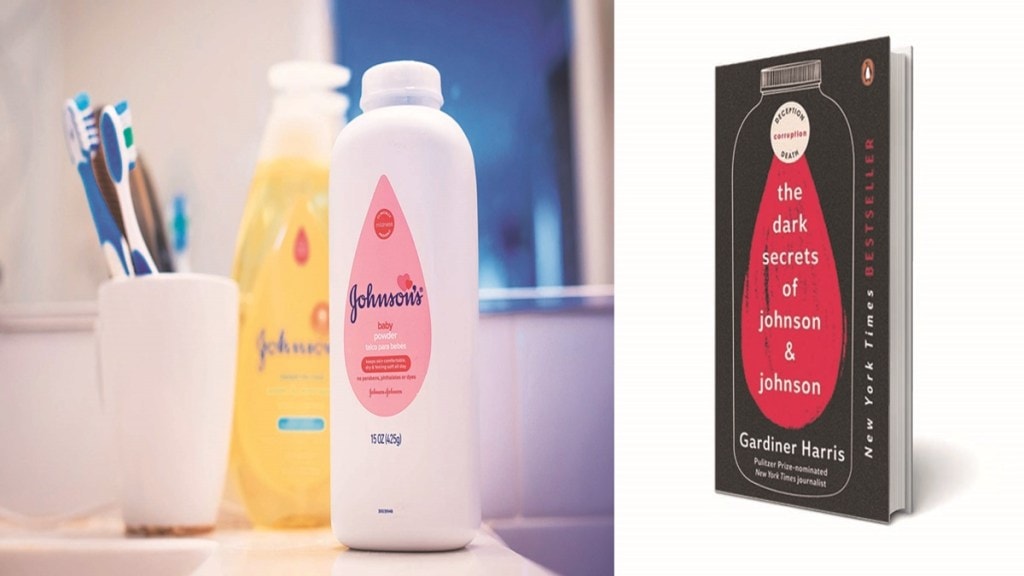By Soma Das
A baby face, and bloodied hands do not go together but that’s the portrait American journalist Gardiner Harris draws of Johnson & Johnson (J&J), the US based pharma and health giant, in his meticulously researched book The Dark Secrets of Johnson & Johnson. Maker of Johnson baby powder, and other baby products, the ‘quintessential American’ company knew that its ‘baby history’ lends its brand a level of trust that is beyond rational—that’s emotional, almost comparable to a bond between a mother and her baby. Not surprising then that despite commanding less than 1% of revenues in recent years, the baby products were treated as its ‘golden egg’. “Trust is Our Product,” announced an internal deck.
When ‘baby care’ became big business
Deeply disturbing is the account Harris convincingly presents on how the company betrayed that ‘trust’, deliberately lying about health benefits of its drugs, hiding harmful effects of its drugs and devices repeatedly over decades, manipulating results of clinical trials, perfectly aware that these missteps could be killing thousands and injuring millions.
Fine-grain talcum powder originally used to come from mines often contaminated with asbestos. Through the Sixties and Eighties, journals on paediatrics warned that many children were inhaling too much powder that blocked air sacs of lungs, at times proving fatal. By the 1980s, one in hundred calls to national poison centres in the US involved children inhaling excessive powder. Eventually, asbestos was declared a carcinogen causing lung and ovarian cancer. Harris uses internal mails, court-room testimonies, and other documents to prove that the company pressured scientists, experts, who suggested that the company’s talc was contaminated with asbestos minerals. Scientists have been indicating for decades that women dusting talc on the crotch had much higher chances of developing ovarian cancer.
Despite knowing that its talc could have asbestos, the company proclaimed in public that it was asbestos-free, kept the regulator in the dark and devised a less-sensitive test that prevented its detection, pleaded the lawyer who represented 22 women suffering from ovarian cancer, winning the case against the company and opening a flood-gate of such cases. A poignant moment through the court case emerges when the company’s talc safety expert Dr Susan Nicholson defends her firm by testifying that she has grown up using that talc. But when the lawyer questions about her mother, she has to admit that she died of what might have been ovarian cancer at 63 years—her case not very different from the women the opponent lawyer was representing.
Chapters on prescription drugs show that there are hardly any ethical boundaries pharma companies are hesitant to cross—and the very foundation on which this healthcare system rested—including doctors and clinical trials—has crumbled.
Companies realised ‘funnelling money’ to doctors had a higher return on investment than spending on research or scientists, and an ‘arms race of cash, freebies and pseudo-jobs’ for doctors ensued. An industry of fake ghost-written medical journal was born, spawning a fog of disinformation—the mechanics of which the author exposes. Drugs were routinely marketed by companies, including J&J for indications (diseases) unapproved by US Food And Drug Administration, a ‘business model’ that was so lucrative that a multi-million dollar future penalty was factored in the revenue model while launching such drugs.
Deep diving into few episodes, the author shows the company was hiding and selectively presenting data from trials that had the potential to cause deaths. Erythropoietin, or EPO, a drug helped spike red blood cells in dialysis patients started to be marketed for cancer patients by J&J, for increasing patient-base despite the company’s multiple trials, indicating that cancer patients on EPO were dying more and faster than their counterparts not on drugs. After independent researchers proved the same, and indicated that the drug might be stimulating tumour growth, a top company executive admitted publicly that they had stopped five such studies where they had seen more people on EPO dying than those on placebo. But earning over $1 billion in 2016, the drug was a star earner for J&J.
For its drug Risperdal, approved for schizophrenia and psychosis, it bypassed diseases, and started selling it for symptoms—illegal as per the FDA rulebook, the author shows. What reads like a belief-defying slope down a dangerous lane, the drug is pushed among children and elderlies—the former with hormonal risks including boys growing breasts and leaking milk at a much younger age, in the latter significantly increasing the risk of stroke, heart attacks and deaths. As part of this, company executives are shown striking deals with a doctor from Harvard, who promises them “if J&J invested in his research, the study would increase company’s sales”. And sales soared, indeed. From 1994 to 2003, US saw a 40-fold increase in children getting treated for bipolar disorder, the highest ever increase rate in any psychiatric diagnosis. “It wasn’t just that Risperdal was largely untested in young children. It was the diagnosis itself… Biederman and his team were effectively treating a condition that didn’t exist—and drawing the entire field into a dangerous game,” the author concludes.
As per elderlies, Memorial Sloan Kettering Cancer Centre found that between 2000 and 2019, Risperdal and similar meds caused 1.2 million needless deaths in elderlies, a count the author pegs as a significant underestimate. It also sold Ortho Eva Birth Control Patches knowing that they could be releasing more and variable estrogen hormone than what is being claimed, leading to heart attacks, strokes, lung clots and deaths in women.
Even more chilling is the role of company in the recent US opioid crisis. While Purdue Pharma became the fall guy for fanning the opioid crisis in the US by selling highly addictive OxyContin as a painkiller, J&J was the largest supplier of opioid raw material (accounting for over 50%) in the US, including to Purdue. The inside stories of the company’s devices in the book are even darker and grislier—with clear intentionality of deceiving for profits built in them. They were selling metal on metal hip implants without clinical trials, despite knowing from doctors that it has a much higher failure rate than metal on plastic ones, causing huge internal boils in patients.
From talc to opioids: A trail of deception
The book offers blood-curdling details on how it sold Prolift vaginal mesh to address urinary problems in women despite knowing that too many women (a third as per an estimate) were having dreadful vaginal wounds including multiple surgeries to fish “jagged pieces of plastic out their vaginal walls”. Of its seven top selling drugs in 2003, the company used illegal marketing, including bribing, kickbacks and lies to FDA, in six of them, legal proceedings reckon. And yet, it remains the only company in the world that can freely use the symbol of red-cross and featured on the Fortune list of most admired companies in 2023.
It is this gap between the positive perception, and deplorable conduct of the company, the author travels with expertise and conviction. Harris may have laser-beamed on J&J, but it is not only a business history book with narrow focus; it’s a brilliant broad-arc masterclass on the systemic failures of healthcare today that analyses how USFDA has failed as a regulator, because it depends on money from the companies it regulates, how press coverage misleads and doctors have succumbed to greed. It should be prescribed as a textbook in healthcare courses. Read discerningly, the book serves as a mirror to our society where ‘care’ has become a PR construct and ‘trust’ is up for sale.
Soma Das is the author of The Reluctant Billionaire and an adviser to agencies in the development sector
Disclaimer: Views expressed are personal and do not reflect the official position or policy of FinancialExpress.com. Reproducing this content without permission is prohibited.
The Dark Secrets of Johnson & Johnson
Gardiner Harris
Penguin Random House
Pp 464, Rs 899







